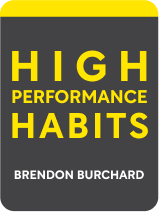

This article is an excerpt from the Shortform book guide to "High Performance Habits" by Brendon Burchard. Shortform has the world's best summaries and analyses of books you should be reading.
Like this article? Sign up for a free trial here .
What are the 6 habits of high performers? Why are they important and how can you implement them in your daily life?
According to personal development coach Brendon Burchard, there are 6 habits of high performers (abbreviated as the HP6). These are deliberate habits that will help you achieve your goals in a healthy and sustainable way.
Read more to learn about 6 habits of high performers and how to cultivate them.
What Are the 6 Habits of High Performers?
High performers are people who maintain success and well-being over a long period of time. They excel more than their colleagues and can adapt to almost any situation. In High-Performance Habits, personal development trainer Brendon Burchard defines 6 habits of high performers (abbreviated as the HP6) that help them achieve their goals in a healthy and sustainable way. These habits are often challenging and require your full attention. The 6 habits of high performers are:
- Search for Clarity
- Improve Your Health
- Find Your Drive
- Increase Your Efficiency
- Generate Influence
- Be Courageous
Habit #1: Search for Clarity
The first of the 6 habits of high performers is clarity, or the ability to identify who you are and what you want. Clarity isn’t something that emerges on its own. It requires reflection and experimentation as you search for the values that matter to you and the goals that will define your journey. There are two ways to gain and maintain clarity in your life: Identify the feelings you’re seeking and determine what’s significant.
Identify the Feelings You’re Seeking
When something happens, take a moment to think, “What feeling am I bringing into this situation, and what feeling do I want to receive from this situation?” This lets you control how you handle your emotional responses. When negative emotions come to the surface, try to channel that energy into a positive feeling, using your body’s natural responses to deal with a high-intensity situation.
Determine What’s Significant
While high performers can tackle almost any task thrown their way, not every challenge is worth the effort. High performers spend their time investing in purposeful things and avoid the trials that don’t hold any meaning for them. For example, if you’re passionate about fitness, training for a marathon would be worth your time. While other challenges such as learning to cook or building a computer may be interesting, they aren’t meaningful in your life and, therefore, shouldn’t be your focus.
Habit #2: Improve Your Health
To be a high performer, you need to tend to your health and well-being because good health builds happiness, focus, and energy. Your health includes your mental, emotional, and physical well-being. To develop healthier habits, master transitions and treat your body better.
Master Transitions
People tend to carry tension without knowing it. To ensure that you don’t allow your frustrations to impact the rest of your day, learn to master transitions. A transition is the moment between two tasks or interactions. For example, if you’re responding to emails, then begin working on a project, you have a moment of transition between the two tasks.
If you feel frustrated or stressed after a task, use these transitional moments to do the following:
- Close your eyes and breathe.
- Relax the areas of your body that are tense. Focus on your shoulders, neck, face, and jaw.
- Dictate the energy and perspective you want to bring into your next task or interaction.
Treat Your Body Better
When you take care of your body, your emotional and mental health improve alongside your physical health. Eating healthy, working out regularly, and sleeping well give you energy, create mental clarity, and release chemicals in your brain that help with emotional management.
Habit #3: Find Your Drive
Drive is the force that motivates you to do your best work. It helps you stay on-track through even the most difficult challenges. Finding your drive requires active exploration and internal affirmation. Drive is hard to obtain and easy to lose. Use the following practices to maintain the internal and external forces necessary to create drive: Remind yourself of the “why” and surround yourself with the best.
Remind Yourself of the “Why”
Constantly remind yourself why you do what you do. Don’t just think it—say it. Verbalizing helps you solidify and affirm what you’re thinking. For example, if you’re an athlete with the goal of going pro, tell yourself before every workout, “This workout gets you one step closer to the big leagues. Your pain today will lead to strength tomorrow.”
Surround Yourself With the Best
Surround yourself with people who are smart, positive, and driven:
- Make a new, positive friend. Adding just one positive person to your life can have incredible benefits and improve your overall outlook on life.
- Seek out volunteer opportunities. Positive, service-driven people are drawn to volunteer opportunities.
- Participate in organized sports. Competitive activities hone your self-evaluation skills and give you clear goals that you must work hard to achieve.
- Find a mentor. Mentors are people who are older and wiser than you. Find someone that you look up to and ask them for guidance.
- Earn your spot. Work hard and achieve success to get into the same rooms as other high performers. The more you accomplish, the more doors open up to you.
Habit #4: Increase Your Efficiency
Increased efficiency helps you focus on the important things in your life and maintain your work-life balance. Efficiency requires planning, reflection, and focus. Methods to increase your efficiency include planning your “five moves” and mastering important skills.
Plan Your “Five Moves”
Work toward an objective and focus your energy and attention on the tasks that are most important to your success. To create a long-term plan, find your “five moves”:
- Solidify your goal. Make sure it’s clear and specific.
- Write down the five major moves you’d need to make to achieve that goal. These are big steps that require many smaller tasks to achieve. For example, if your goal is to become a published author, one of your major steps may be to “get a literary agent” or “find a way to self-publish.”
- Under each of your five major moves, write down a list of tasks that you need to do to accomplish that step. For example, if your goal is to “get a literary agent,” your tasks would include researching agencies, crafting writing samples, fixing up your resume, and practicing your interviewing skills.
- Once you have a list of tasks, put them into your calendar and hold yourself to hard deadlines. Giving yourself a specific schedule will motivate you to complete tasks in a timely manner.
Master Important Skills
To start your journey towards mastery, define the five most important skills in your field. Constantly be on the lookout for new educational opportunities and improved ways of working. For example, if you’re a salesperson, important skills include communication, problem-solving, customer service, negotiation, and market awareness.
Habit #5: Generate Influence
To become a high performer, you need a group of people around you who are willing to support and invest in you. The best way to achieve this is by generating influence. Influence is not tied to personality traits such as introversion or extroversion. Anyone can become influential if they put energy into developing their relationships. To foster your relationships, be generous and consider the ways you can use influence as a leader.
Be Generous
Be willing to provide favors. The more willing you are to give, the more your friends, family, and colleagues will trust and respect you. Often, people avoid being generous by making the excuse, “I’m simply too busy.” If you feel you’re too busy to be helpful or generous, chances are you have a time-management problem or are just unwilling to be generous.
Influence and Leadership
As a leader, gain influence by using the following three principles:
- Change how people think: High performers show others how they want them to think. By asking framing statements and questions such as, “Think about it like this…” or “What would you think if I…”, you can adjust the way people look at a situation. If you lead people into more efficient models of thinking, you’ll start to earn their trust. As you do, you’ll be able to shape the way that they think about their role and their impact on the world around them.
- Challenge people to raise the bar: High performers know how to challenge the people around them without insulting or degrading them. They set standards for the people around them and hold them accountable. Though they have to endure the occasional awkward conversation, high performers know how important it is to push people to meet and exceed expectations.
- Practice what you preach: Once they’ve set high standards and shown people how to think, high performers adhere to the expectations they set. If you don’t, people will view you as hypocritical and ignore your guidance.
Habit #6: Be Courageous
The last (but not least) habit of the 6 habits of high performers, is courage. High performers courageously step into the unknown and take action. Courage is the willingness to take purposeful action in service of a worthy and sincere goal despite fear, danger, or adversity. Courage requires a mindset of gratitude, a tendency for action, and the willingness to face your fears. To begin to develop courage, appreciate the hardship.
Appreciate the Hardship
Hardship is often the route to success. It develops your character, thickens your skin, and builds your skillset. For example, a world-class athlete didn’t get to the top of their game by using “get fit quick” plans. They worked out every single day, struggled through injuries, and fought to overcome obstacles.
To change your mindset on hardship, consider the following principles:
- Embrace the challenge. Learn to enjoy taking on and overcoming obstacles. This will help you change your fear to excitement.
- Accept that difficult and unappealing tasks are essential to growth. There is no “easy way” to high performance. Remind yourself that the frustrating tasks you’re facing are helping you grow as a person.
- See the light at the end of the tunnel. Always remember that there are better times ahead. Remind yourself why you’re doing what you do and fight relentlessly towards that goal.

———End of Preview———
Like what you just read? Read the rest of the world's best book summary and analysis of Brendon Burchard's "High Performance Habits" at Shortform .
Here's what you'll find in our full High Performance Habits summary :
- The 6 habits that high performers have
- How being a high performer is about more than one big achievement
- The 3 traps that can foil you, even if you're a high performer






